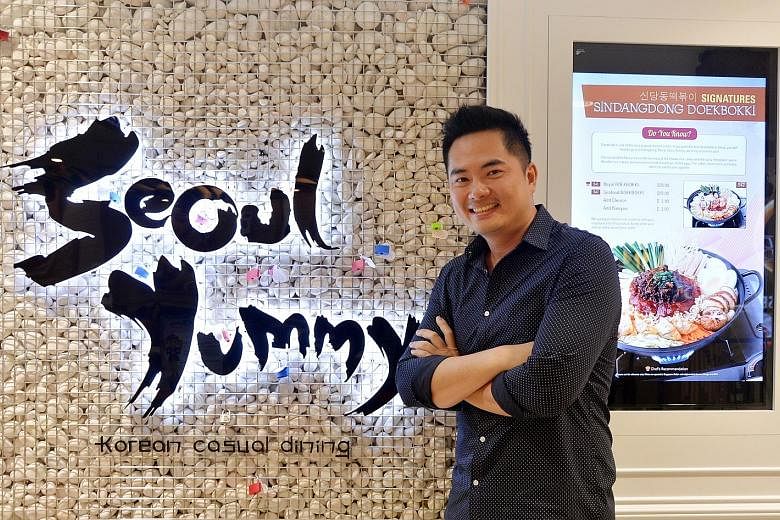Home-grown restaurant chain Gratify Group has been looking to take its Seoul Yummy brand overseas for over a year now, but has not made much headway.
It could be a prime candidate for the sort of fresh official help being considered for companies seeking to expand overseas - after facing hurdles such as a lack of brand awareness and resources as well as finding the right business partners abroad. There are seven Seoul Yummy outlets, with another due to open next month.
Founder Frank Lau said: "Seoul Yummy would hit a plateau of 12 outlets in Singapore in the next two to three years, so we hope to continue to grow the brand overseas."
The markets under consideration include Australia, China, Indonesia and Malaysia, which the firm prioritises owing to its proximity to Singapore and lower cost of operation.
It intends to "refresh" the Seoul Yummy brand later this year with a new logo and brand positioning.
Gratify Group - which also runs Omoomodon eatery - tapped a government grant last year to develop a franchising model which it will use for Indonesia and Australia.
For Malaysia, the firm plans to go there on its own but has faced difficulties in getting reasonable deals due to its weak brand awareness, the lack of a local network as well as resource constraints.
"It is not easy to find people who are willing to station themselves in a foreign land and fight for you, especially for SMEs... You also need enough cash to build a good buffer against initial set-up costs and any potential risk," Mr Lau told The Straits Times.
These challenges were highlighted in the recent report by the Committee on the Future Economy, which is recommending more support to help companies internationalise and to spur more people to take up overseas postings.
The Association of Small and Medium Enterprises (Asme) suggests rolling out more programmes to train SME staff to work abroad.
Asme president Kurt Wee said: "There is a need to look at the possibility of a training incubation and wage support scheme for maybe 18 to 24 months for companies that want to (venture) overseas."
Such training could include nurturing a deeper understanding of labour union matters, employment rules, taxation and overseas customs, given that the business environment differs markedly from country to country.
To encourage firms to explore foreign markets, Mr Wee recommends a temporary broad-based SME internationalisation grant, which can help to defray about 50 per cent of the cost of overseas business trips .
Mr Wee said: "Let's say you give a firm $6,000 in grant - that equates to $12,000 worth of travel. In the Asean context, that's four to five trips a year. Imagine the impact when the whole SME ecosystem make that extra four or five trips to do business development."
A Singapore Business Federation (SBF) survey last year found that eight in 10 firms are keen to venture into Asean, but many are not aware of the opportunities arising from the Asean Economic Community.
SBF chief executive Ho Meng Kit said companies need more support in identifying suitable business partners and have greater access to comprehensive market information.
Mr Ho added: "We recommend more opportunities in terms of government procurement projects to our local businesses, so that they can build their track record for internationalisation and growth."
In the same vein, Mr Wee hopes big local firms abroad have a "national preference" for Singapore SMEs in project tenders.
These suggestions are on top of IE Singapore's various schemes to help firms set up abroad, including the Market Readiness Assistance grant and Global Company Partnership grant.
The agency said it provided broad-based assistance to 28,000 companies in 2014 and 34,000 in 2015. Figures for last year will be released later this week.
IE Singapore also has 35 offices worldwide that provide market information to firms and help them navigate the overseas market.


